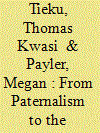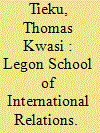|
|
|
Sort Order |
|
|
|
Items / Page
|
|
|
|
|
|
|
| Srl | Item |
| 1 |
ID:
187042


|
|
|
|
|
| Summary/Abstract |
This article explores the working relationship between the United Nations (UN), African Union (AU), and the Economic Community of West African States (ECOWAS) in mediating conflicts in West Africa and the Sahel regions. We argue that through the United Nations Office for West Africa and the Sahel (UNOWAS), the UN, ECOWAS and the AU are working on mediation efforts to transcend traditional conceptualizations of the relationship between the world body and regional organizations. We show that the partnership is grounded on the logic of subsidiarity, informality, elite networks, technical competence, soft skills, and robust social trust. For heuristic purposes, we call the six principles the Chambas Formula, with reference to the centrality of the Special Representative of the Secretary-General for West Africa and the Sahel, Mohamed Ibn Chambas, and the emergence and consistent application of the principles in the mediation setting in West Africa and the Sahel regions.
|
|
|
|
|
|
|
|
|
|
|
|
|
|
|
|
| 2 |
ID:
183221


|
|
|
|
|
| Summary/Abstract |
The article explores the Legon School of International Relations (LSIR) which is the research, teaching, and academic programming of International Relations (IR) at the University of Ghana, Legon. The LSIR came out of attempts to decolonise knowledge production, dissemination, and academic programing in Ghana in early 1960s. The article shows that the LSIR is decolonial in theoretical perspective, grounded in southern epistemologies, relational in ontology, qualitative in methodology, practice-based, and it is equity-oriented. Although the LSIR scholarship as a package is distinctive, some of its ideas overlap with the work of several contemporary IR communities in the West. The article highlights implications of the LSIR story for the IR communities in the West and the value of paying close attention to the works of IR centres of scholarship in Africa.
|
|
|
|
|
|
|
|
|
|
|
|
|
|
|
|
|
|
|
|
|